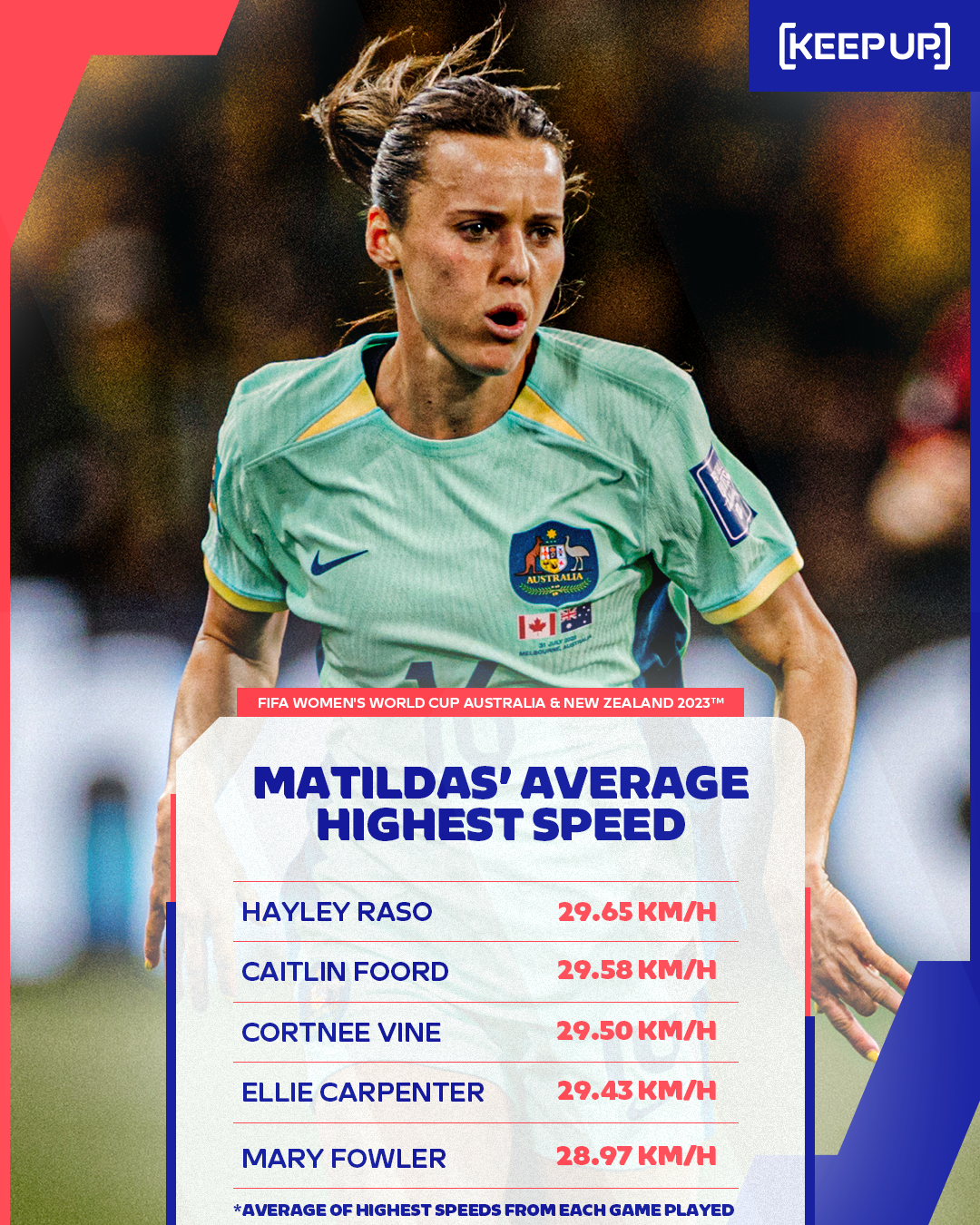Coach Tony Gustavsson’s reliance on a central core of players so far means their workload is intense, writes Tom Smithies.
No wonder the buzzword of the weekend at Matildas HQ has been “recovery”. As the Australian squad prepares for a World Cup quarterfinal with France, new data from FIFA and from Opta shows the physical effort expounded by a core of Tony Gustavsson’s squad.
LIVE COVERAGE: Matildas v England, FIFA Women’s World Cup semi-final
Having managed to help several players overcome tournament-threatening injuries, Gustavsson’s sports science staff now have another major task to navigate – maintaining the endurance levels of players who have already run significantly more than France’s squad.
Of the 23 players who make up the Australian contingent, eight of them have played between 359-360 minutes in the Matildas’ four games to date (injury time is not included in the data collection, despite the often significant amounts at this World Cup). Another, Hayley Raso, has accumulated 330 minutes.
So far Gustavsson has stuck tightly to a narrow group of players: giving game time to 17, but three of those have seven minutes of playing time between them. A fourth, Sam Kerr, has had just 10 minutes.
By contrast, Herve Renard’s penchant for rotating his players means only one has played every minute – goalkeeper Pauline Peyraud-Magnin – and only another two have even accrued more than 300 minutes. The rest have played more than an hour less than many of the Australians – but equally, all bar two have played at least 30 minutes.
The differential in playing minutes means a number of the French have covered rather less ground to date than their counterparts in green and gold. Katrina Gorry, perhaps unsurprisingly, is the Matilda with the most prodigious motor, averaging within 41m of 11km every game so far.

Narrowly behind her, rather less predictably, is Mary Fowler, averaging 10.93km albeit over three games rather than four. Fowler, it’s worth noting, has the most distance covered in a single game – 11.7km in the 4-0 defeat of Canada on July 31.
In total, five Australians have exceeded an average of 10.7km a game over four games (or three in Fowler’s case). Compare that with France, whose highest average per game is the 9.83km accrued by Elise de Almeida, and in whose squad only five other players have exceeded 9km a game in playing three games or more.
To put those Australian numbers in broader context, the top five Matildas for distance covered have run further than all bar two of the Socceroos in their four games at the men’s World Cup in Qatar late last year – topped only by Aaron Mooy and Jackson Irvine.
The Australian game plan was always going to be based on power and athleticism (borne out by the fact the Matildas have outrun their opponents in three of their four games, with only Ireland covering more ground) – as part of that they have access to gold-standard sports science in recovering from each game. But it’s highly unlikely, beyond the return of Sam Kerr, that Gustavsson will change anything fundamentally now. These players have to dig deeper and deeper to try to drive Australia on at the back end of the tournament.
The game plan will also be built on speed – as is France’s, and it promises to be a high-octane contest. Alarmingly, the two players across both squads who have maintained the fastest average speed across their games are the French striking duo of Eugenie Le Sommer and Kadidiatou Diani, averaging a top speed of 29.73km/h and 29.7km/h respectively.

Behind them are the Australian trio of Hayley Raso (29.65km/h), Caitlin Foord (29.58km/h) and Cortnee Vine (29.5km/h). The only defenders in the top 10 players for average high speed are Ellie Carpenter (29.43km/h) and France’s left back Sakina Karchaoui (28.93km/h).
Bizarrely, while Australia’s single fastest sprint at the World Cup is the 32.4km/h produced by Hayley Raso against Denmark, for France it is the 32.8km/h seen in the comfortable 4-0 defeat of Morocco in the Round of 16 – and recorded by goalkeeper Peyraud-Magnin.
“My sports science and sports medicine team, they’re freaking world-class,” said Gustavsson last week. Over the next few days, they will have to show that once more to get the Matildas in a position to chase World Cup glory.


